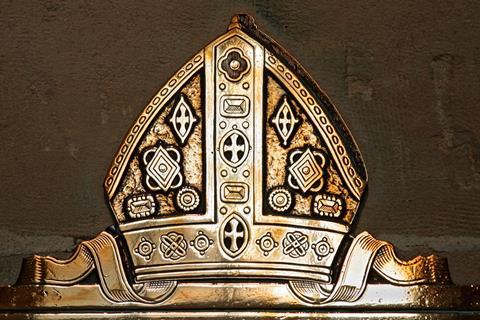The Church of England needs a clean slate and a fresh pair of eyes, says Michelle Guinness. Is it time for a female Archbishop of Canterbury?

A few weeks ago, I discovered some scribbled notes I’d written on a potential novel about the first woman Archbishop of Canterbury. They were dated 1990 - just after Margaret Thatcher’s resignation as Prime Minister - and four years before women were ordained
The book was never written - too busy juggling a senior management job in NHS communications, being a mother, and married to the church. But as the years went by, it seemed clear that the Anglican ship was sinking - out of touch, out of date, weighed down by inadequate leadership, budgets and vision, hidebound by the established way of doing things and generally unfit for purpose. So in 2012, two years before Synod’s decision to appoint women bishops, in sheer desperation at the decline of an organisation I had come to love for its breadth of tradition, its balance, and the apparent safety of its accountability structures, I began to imagine a church reinvigorated from within. Could a woman, a wild card at that, known for her progressive, reformist views ever become Archbishop of Canterbury? When she did, how might she do the job differently, and would she last long enough to make the necessary changes? And so the first female Archbishop of Canterbury was born.
I set the story in 2024, about as far ahead as I could envisage, hoping that it might, in some small way, be prophetic. I have always felt that anyone coming into an institution as a rank outsider, as I was, (raised in a practising Jewish family), is granted a certain objectivity about its foibles. If being prophetic in the Old Testament sense constitutes a call to the people for authentic and radical living, then as “seers” we are probably well-placed to highlight the obvious anomalies. And what was clear to me then, and is now, more than ever, is that we cannot leave a sinking ship in the docks.
A woman’s touch
Perhaps now, instead of appointing the traditional, middle class male to the most senior post in the Anglican church, the time has actually come for a bold and fresh approach. I have written extensively on women’s fight for equality in the church and well remember how embattled and bruised we often were. We got used to storming the barricades, pushing against the boundaries, breaking through the frontiers, and perhaps it’s perseverance in the face of opposition, courage in challenging resistance to change, and determination in facing endless objections and difficulties, that a woman would bring to the job.
We need a clean slate, a fresh pair of eyes, someone who isn’t driven by the need to please, torn apart by lobbyists, or fazed by aggressive male hostility and obstructiveness. Someone secure enough to ditch the endless, churchy, formal engagements and compulsory travels to make space for a more meaningful interface with the public, someone with the human touch who, while having an astute grasp of theology will have the ability to communicate and apply it to the issues that affect the wider world: the arts, culture, sport, prostate cancer, infertility, divorce, mental health, poverty, disablement, pressure, sexuality, bereavement and heartache. At a time when a woman preacher was still a novelty a female friend of mine was approached after the service by a man in tears who whispered to her, “No man can touch the pain in another man like a woman can.”
My favourite bosses have all been men. But I once asked the first female Superintendent of Police in the UK what she, as a woman, brought to such a man’s world: “I gave the men permission to cry,” she said.
Better perhaps not to fall into the trap of gender stereotyping, risking the suggestion that women somehow have superior gifts. We don’t - even if we have a tendency to see ourselves as Wonder Woman, deftly juggling dozens of different demands at once. In fact, my favourite bosses have all been men. But I once asked the first female Superintendent of Police in the UK what she, as a woman, brought to such a man’s world: “I gave the men permission to cry,” she said.
The role of the Archbishop: Shepherd or CEO?
The Church of England seems to have become more hierarchical and dictatorial in recent years, leaning towards a colder, business management model, making the post more impersonal, less in the public square. The Archbishop is not a CEO. He or she is first and foremost a “shepherd of the flock ”, sharing pastoral responsibility for the spiritual wellbeing of those with faith and none with the clergy on the ground. And given the current situation, the public may well feel a woman would be more trustworthy with safeguarding issues. She may be more aware of the horrors of abuse, as so many have been subject to it at some point in their lives.
The barriers to entry
But how likely is a woman Archbishop? I haven’t a crystal ball, but not very likely, I fear. My prophetic timing may be slightly out. Fiction can overlook certain realities. The Crown Nominations Commission, consisting of bishops, clergy and laity that suggests two names to the King as Head of the Church is not generally known for its radical thinking. Secondly, it tends to appoint an already diocesan bishop because of their experience, and that leaves very few women to choose from, as most current female bishops are in assistant or suffragan posts. Thirdly the worldwide Anglican church has never ceased to be extremely unhappy with women in church leadership. 90 per cent of overseas bishops are male. Some overseas dioceses have no female clergy at all. And some UK churches still refuse a woman vicar. A Commission that is risk-averse may settle for a disappointing compromise. However, Synod has stood its ground on permitting gay blessings, which is already causing many overseas churches to secede, so some may argue there’s not much left to lose.
And finally, a retired bishop confided: “Who in their right mind would take it on? It’s a monumental job, the scope only equal to the level of attrition.” Research shows women have a tendency to decline heavily pressurised jobs because they have other priorities like family, friends and relationships. So all power to her elbow, she who does.
For whoever draws the short straw I have but one request. Don’t wear the mitre - only re-introduced into the church in the early twentieth century and a vivid symbol of separation from the people if ever there was one. Besides, it does the men no favours; the women even less.





































1 Reader's comment